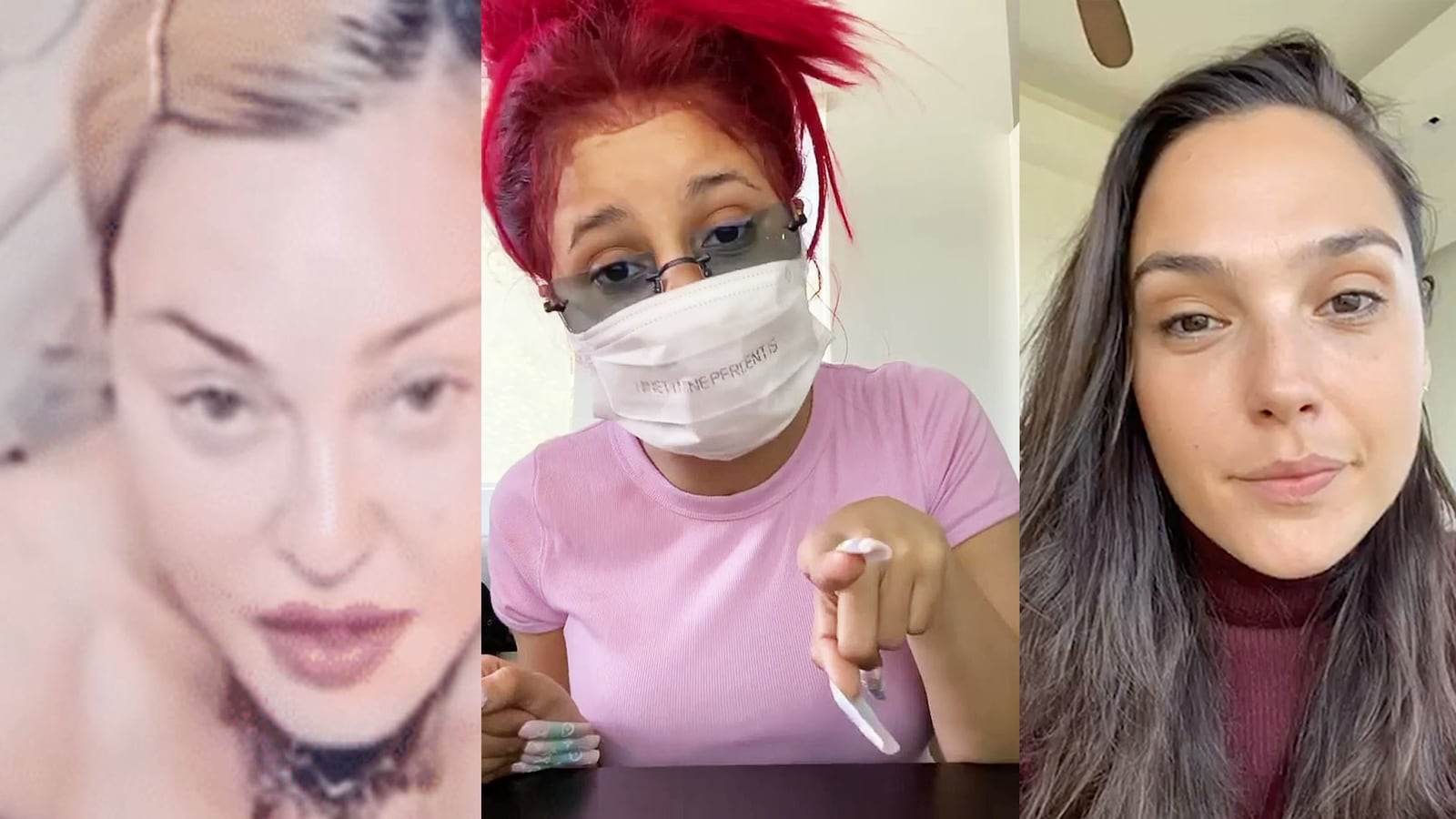Every night in countries around the world, citizens quarantined due to the novel coronavirus have taken a moment to lean out their windows and applaud the health workers putting themselves on the front line. In taking that moment to clap and bang pots and pans, people have found a tangible way to express solidarity with medical workers as well as each other. Videos of the inspiring gesture have spread around the world through social media, inspiring hope and connection at a time when it’s direly needed.
This week Priyanka Chopra, like many of us, felt inspired by these gestures as well—so she posted a video of herself applauding in an effort to support India Prime Minister Narendra Modi’s Janta Curfew, which aims to curb the spread of COVID-19 in India. “People around the world have shown their appreciation for the doctors, nurses and all first responders by clapping on their balconies,” Chopra wrote. “Although I couldn’t be there in India today to join, I am there in spirit. #jantacurfewIndia.”
But unlike those Spaniards and Italians, Chopra’s applause from afar did not garner praise. Instead, she got roasted for clapping into the air. (Although that did not stop James Bond cast members from posting their own video doing the same on Thursday.)
Chopra is just one of several celebrities whose attempts to express solidarity have yielded unanticipated ridicule. There were, of course, all those celebrities who got together to sing a pitchy, nearly unwatchable a cappella version of John Lennon’s “Imagine” last week. There was Madonna, who proclaimed that “coronavirus is the great equalizer” while marinating herself in a bathtub full of milky water and flower petals. (January Jones also posted a video of herself preparing her own fancy bath—a cocktail including pounds of salt, baking soda, and vinegar.) And Sia posted a treacly graphic in which the word “virus” was scratched out to simply read, “us.” (Twitter user @gayskz responded with a graphic of their own: “Give US your fucking money.”)
Examples of celebs’ bizarre, boredom-induced behavior are endless. But more fascinating than the cringey antics themselves are the rifts they represent. It’s a collision of several trends that have fundamentally changed the nature of celebrity—and some celebrities, it seems, are better at navigating that terrain than others.
The infamous “Imagine” video is, perhaps, our best case study so far. On the surface, a bunch of celebrities singing an earnest, if vague, plea for unity seems benign enough—but reactions ranged from bemusement to unmitigated outrage. Critics pointed out the song’s emphasis on sentimentality rather than actual action and, more importantly, the irony of a bunch of obscenely rich people claiming to fantasize about a world with “no possessions.”
Wonder Woman star Gal Gadot, who organized the video, had hoped to express solidarity with everyone quarantined around the globe—but with the camera turned on herself and her famous friends, the finished product seemed, more than anything, like an act of vanity. As Bustle writer Casey Cipriani succinctly put it on Twitter, “Hey celebs, we don’t want to be sung to. We want you to use a million or two of your money and order ventilators, masks, and gloves from the manufacturers then donate them to a hospital. Or pay for the salaries of an entire staff at a bar, restaurant, or daycare.”
Gadot’s video felt oddly reminiscent of another overly earnest celebrity singalong: The “Fight Song” video Elizabeth Banks and others made for Hillary Clinton in 2016. Both videos assume that the average person will get emotional while watching a bunch of celebrities sing—with varying degrees of proficiency—a tune designed to uplift on extremely vague terms. In a parody video with Stephen Colbert on The Late Show at the time, John Oliver quipped, “No one mentioned this was part of a weirdly earnest a cappella song for Clinton. Awful!… This song is going to irritate people.” And it did! The song itself came to be widely derided, even by reporters who begged for it to be turned off.
Part of the public’s increased impatience for celebrity exhibitionism posing as activism also stems from the political climate. Colbert replacing Jimmy Fallon as the leading voice in late night was more than just backlash for that hair ruffle heard ’round the world; it was also a rejection of the Fallon ethos, which emphasizes giving celebrities airtime to play whatever mindless games they want. Colbert’s rise signified a hunger for substantive conversation—and celebrities willing and able to frankly discuss those topics in addition to the usual late-night puffery.
But above all, the negative reactions to these empty celebrity gestures represent the rising awareness surrounding wealth inequality. As progressives have found a stronger voice in discourse, with Bernie Sanders and Elizabeth Warren centering these disparities within their campaigns, celebrities have found themselves on the opposite side of a popular, if tongue-in-cheek mantra. They are not, and obviously have never been, just like us.
Looking back, it’s pretty ironic that Us Weekly’s most recognizable feature owes its existence to a photo of Drew Barrymore stooping down to pluck a penny from the sidewalk. As Ruth Graham explains in Slate, editor Bonnie Fuller spotted the photo among several that had come in one morning from the wires in 2002. “Look at Drew Barrymore picking up a penny,” she said. “It’s like, stars, they’re just like us.”
The recurring “Just Like Us” feature commodifies photos that once had been impossible to sell: celebrities eating fast food, pumping gas, checking the mail… photos paps usually captured while angling for more explosive material. As a result, every minute detail of celebrities’ lives became newsworthy in its own way. The internet has only magnified the trend, contributing to what Graham aptly calls an “always-‘on’ celebrity culture.”
That milieu can certainly explain why some stars think it might be comforting for fans to watch them hole up in their mansions and draw fussy baths—but they failed to account for the fact that the feature itself has always been partly humorous. It’s only novel because we know entertainers’ lives are, really, fundamentally different from our own. And now, those disparities are more impossible to ignore than ever—because they’re deadly.
But in fairness, what should we have expected from these celebrities—who are often asked to champion causes because the media pays them more attention than the activists on the ground? As tone-deaf as some stars’ efforts have been in the past few weeks, they all feel of a piece with where we are right now, at a time when celebrities are asked to chime in on anything and everything—regardless of how qualified they might actually be to comment.
It’s that very impulse that Dave Chappelle mocked with his memorable “Where is Ja Rule?!” bit, in which he said he’d seen a news clip of Ja Rule being asked about September 11. “Who gives a fuck what Ja Rule thinks at a time like this?!” Chappelle wondered in his 2004 special For What It’s Worth—and it’s a good question. But as pediatrician and author Dr. Paul Offit put it to Jessica Grose in an excellent piece about the history of celebrity activism for The New York Times, “We can’t have it both ways. If we give [celebrities] the platform, we expect them to use it for the good, but it’s our fault if they don’t. We give them that attention” no matter what.
It’s fascinating, then, to see which celebrities’ messages have landed in recent weeks. Taylor Swift and Ariana Grande have urged fans to take the pandemic seriously and take necessary precautions. Cardi B has decried celebrities’ ability to get tested while millions of non-famous civilians struggle to do so. Britney Spears reposted a quote from Brooklyn-based artist Mimi Zhu calling for wealth redistribution and a general strike. Fran Drescher also retweeted a call for a strike, writing, “Capitalism has become another word for Ruling Class Elite! When profit is at the [expense] of all things of true value, we gotta problem.”
These posts all share one characteristic: They’re concrete messages, aimed at fans’ wellbeing. It’s noteworthy that both Swift and Grande have also been quietly donating money to struggling fans. And to her credit, Chopra has also been working with the World Health Organization to spread accurate information about COVID-19. But next time she or any other celebrities contemplate what kind of content their fans might want from them right now, they might remember the greatest lesson from those videos of people clapping from their windows: The camera lens is always pointing outward, toward the people—not one person.


